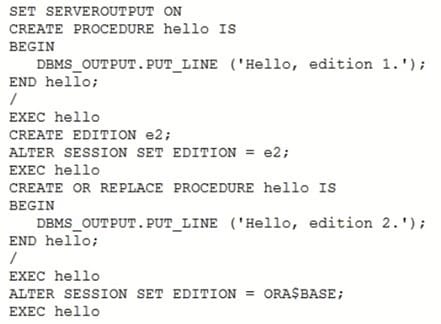1Z0-148 Online Practice Questions and Answers
Identify the component of the PL/SQL hierarchical profiler that uploads the result of profiling into database tables.
A. the trace file component
B. the analyzer component
C. the shared library component
D. the data collection component
You executed the following command to alter the session parameter:
SQL> ALTER SESSION SET PLSCOPE_SETTINGS = 'IDENTIFIERS:ALL';
Which two statements are true in this scenario? (Choose two.)
A. If the SYSAUX tablespace is unavailable, and you compile a program unit, PL/Scope does not collect data for the compiled object.
B. All the identifiers declared in compiled program units before altering the parameter settings appear in the *_IDENTIFIER static data dictionary views.
C. All the identifiers declared in compiled program units before altering the parameter settings do not appear in the *_IDENTIFIER static data dictionary views.
D. If the SYSAUX tablespace is unavailable, and you compile a program unit, PL/Scope collects data for the compiled object and stores it in the SYSTEM tablespace.
Which two statements correctly describe the features of SecureFiles? (Choose two.)
A. Compression does not entail table or index compression and vice-versa.
B. Encryption stores the encryption keys for the LOB columns inside the database.
C. Encryption stores the encryption keys for the LOB columns outside the database.
D. Compression stores identical data occurring two or more times in the same LOB column as a single copy for the table.
The database instance was started up using the automatic memory management feature. No value was
set for the RESULT_CACHE_MAX_SIZE parameter.
Examine the following initialization parameter settings for your database:
MEMORY_TARGET = 500M
RESULT_CACHE_MODE = MANUAL
You execute a query by using the result_cache hint. Which statement is true in this scenario?
A. The query results are not stored because no memory is allocated for the result cache.
B. The query results are stored and 0.5% of the memory target is allocated to the result cache.
C. The query results are stored and 0.25% of the memory target is allocated to the result cache.
D. The query results are not stored because the RESULT_CACHE_MODE parameter is not set to FORCE.
Which two statements are true about BFILES? (Choose two.)
A. BFILES support only sequential reads.
B. BFILES can be used as attributes in an object type.
C. When LOB is deleted, the corresponding physical file is automatically deleted.
D. The RMAN backup automatically backs up the BFILE locators and the corresponding physical files.
E. The physical file corresponding to a BFILE locator must reside on the file system that is accessible from the server where the database exists.
Which two statements are true about cursor variables? (Choose two.)
A. Cursor variables can be parameterized like cursors.
B. The query associated with a cursor variable cannot reference host variables and PL/SQL variables.
C. The FETCH statement executes the query associated with a cursor variable and identifies the result set.
D. Cursor attributes (%FOUND, %NOTFOUND, %ISOPEN, and %ROWCOUNT) can be applied to a cursor variable.
E. The OPEN FOR statement executes the query associated with a cursor variable and identifies the result set.
Examine this code:

The anonymous block fails this error stack:

Which two changes, when separately applied, would prevent these errors from occurring?
A. Define v2 as employees%ROWTYPE.
B. Initialize v1 and v2 with appropriate constructor functions.
C. Define v2 as pkg. rec.
D. Nothing because using the function TABLE (V1) is prohibited.
E. Define v1 as employees%ROWTYPE.
Which statement is true about internal and external LOBs?
A. An external LOB can be loaded into an internal LOB variable using the DBMS_LOB package.
B. A NOEXIST_DIRECTORY exception can be raised when using internal and external LOBs.
C. Internal and external LOBs can be written using DBMS_LOB.
D. After an exception transfers program control outside a PL/SQL block, all references to open external LOBs are lost.
E. When using DBMS_LOB.INSTR for internal and external LOBs, DBMS_LOB.OPEN should be called for each LOB.
Which two blocks of code execute successfully?
A. DECLARESUBTYPE new_one IS BINARY_INTERGER RANGE 0..9;my_val new_one;BEGINmy_val :=0;END;
B. DECLARESUBTYPE new_string IS VARCHAR2 (5) NOT NULL;my_str_new_string;BEGINmy_str := `abc';END;
C. DECLARESUBTYPE new_one IS NUMBER (2, 1);my_val new_one;BEGINmy_val :=12.5;END;
D. DECLARESUBTYPE new_one IS INTEGER RANGE 1..10 NOT NULL;my_val new_one;BEGINmy_val :=2;END;
E. DECLARESUBTYPE new_one IS NUMBER (1, 0);my_val new_one;BEGINmy_val := -1;END;
Examine this code:

Assuming the default edition is ORA$BASE, what is the result of the last execution of hello?
A. Hello, edition 1. Hello, edition 2.
B. Hello, edition 1.
C. Hello, edition 2.
D. Hello, edition 2.
Hello, edition 1.
E. An exception is raised.